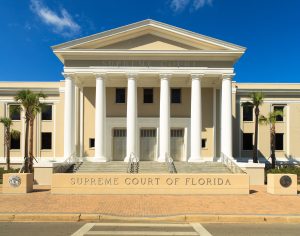 A property insurer, having paid for covered damage, can recover the loss by seeking reimbursement from its insured where the insured has recovered funds from a responsible third-party, or the insurer may pursue a claim directly against the third-party. If the insurer makes a direct claim against the responsible party, to what extent must the insurer allocate the money it recovers to reimburse the insured for its deductible? In an opinion issued on July 3, 2019, the Washington Supreme Court held that a fault-free insured must receive the full amount of its deductible before the insurer may allocate any of the recovered funds to itself. Daniels v. State Farm Mutual Automobile Insurance Co., Wash., No. 96185-9, 2019 WL 2909308 (July 3, 2019). Read more ›
A property insurer, having paid for covered damage, can recover the loss by seeking reimbursement from its insured where the insured has recovered funds from a responsible third-party, or the insurer may pursue a claim directly against the third-party. If the insurer makes a direct claim against the responsible party, to what extent must the insurer allocate the money it recovers to reimburse the insured for its deductible? In an opinion issued on July 3, 2019, the Washington Supreme Court held that a fault-free insured must receive the full amount of its deductible before the insurer may allocate any of the recovered funds to itself. Daniels v. State Farm Mutual Automobile Insurance Co., Wash., No. 96185-9, 2019 WL 2909308 (July 3, 2019). Read more ›
Insured Made Whole After Subrogation Recovery
Pennsylvania Supremes to Decide Whether Actual Cash Value Includes General Contractor Overhead and Profit
 Insurance companies may no longer be allowed to rely on clear policy language that expressly excludes general contractor overhead and profit (“GCOP”) from actual cash value payments. The Pennsylvania Supreme Court recently agreed to hear argument on the issue in Kurach v. Truck Insurance Exchange, Case No. 532 EAL 2018.
Insurance companies may no longer be allowed to rely on clear policy language that expressly excludes general contractor overhead and profit (“GCOP”) from actual cash value payments. The Pennsylvania Supreme Court recently agreed to hear argument on the issue in Kurach v. Truck Insurance Exchange, Case No. 532 EAL 2018.
The facts in Kurach are undisputed. The insureds, who admittedly chose not to repair the damage to their homes, filed a class action lawsuit against Truck for its alleged breach of contract by not including GCOP in its actual cash value payments. The policies at issue expressly provided that “actual cash value settlements will not include estimated general contractor fees or charges for general contractor’s services unless and until you actually incur and pay such fees and charges, unless the law of your state requires that such fees and charges be paid with the actual cash value settlement.” Based on that language, Truck advised its insureds that they were not entitled to GCOP until such costs were incurred. The insureds disagreed and argued the provision was ambiguous and otherwise contrary to Pennsylvania law. Read more ›
Key Questions to Consider in Light of Operation Rubicon’s Investigation into Insurance Fraud in South Florida
 Law enforcement in Miami-Dade County, Florida recently arrested nine individuals described by Florida Chief Financial Officer Jimmy Patronis as the “ringleaders of an elaborate fraud scheme” led by Barbara Maria Diaz de Villegas,[1] owner of the public adjusting company The Rubicon Group.[2] The arrests were the result of a year-long investigation, known as “Operation Rubicon,” to investigate insurance fraud, and demonstrate that efforts are being made to curb insurance fraud in South Florida. According to a February 2019 report from the Federal Trade Commission, Florida is ranked as the number one state for fraud and is home to 18 of the top 50 cities in the United States in terms of fraud reports.[3]
Law enforcement in Miami-Dade County, Florida recently arrested nine individuals described by Florida Chief Financial Officer Jimmy Patronis as the “ringleaders of an elaborate fraud scheme” led by Barbara Maria Diaz de Villegas,[1] owner of the public adjusting company The Rubicon Group.[2] The arrests were the result of a year-long investigation, known as “Operation Rubicon,” to investigate insurance fraud, and demonstrate that efforts are being made to curb insurance fraud in South Florida. According to a February 2019 report from the Federal Trade Commission, Florida is ranked as the number one state for fraud and is home to 18 of the top 50 cities in the United States in terms of fraud reports.[3]
The alleged fraud scheme involved public adjusters, water mitigation and restoration companies, insurance agencies and agents, appraisers, and willing homeowners. The Miami-Dade State Attorney’s Office is also considering arrests of homeowners who engaged in the alleged scheme. The scheme allegedly involved the adjusters recruiting homeowners, and then having a plumber create damage at the property.[4] In conjunction with the plumber creating property damage, an insurance agent would allegedly increase the coverage on the property, or procure coverage if the homeowner was uninsured. Read more ›
Posted in Water
Free Ride on RCV? Not So Fast!
Most property insurance policies condition the payment of replacement cost value (RCV) on the property first being replaced or repaired, and courts typically enforce that requirement. Replacement cost is not owed until the insured completes repair or replacement. Yet what property adjuster has never encountered an insured who attempts to claim reimbursement for items not damaged in the loss on the theory that such items are within the RCV estimate and are a part of the property’s “restoration”?
A recent Washington Court of Appeals decision illustrates. In Mount Zion Lutheran Church v. Church Mutual Ins. Co., 2019 WL 2177893 Wash. App. (filed March 18, 2019; ordered published May 14, 2019), a fire damaged the interior of a church sanctuary. Church Mutual obtained a replacement cost estimate of $729,106, and an ACV estimate of $593,361. The insurance policy allowed the insured, Mount Zion Lutheran Church, to collect ACV regardless of whether it chose to repair or replace. The insured had the option to rebuild, in which case it could then collect repair or replacement costs that exceeded ACV. Church Mutual paid the ACV to Mount Zion. It withheld the difference between RCV and ACV, approximately $135,744, pending the church’s completion of repairs.
The RCV estimate included over $196,000 to replace arched glulam beams in the church sanctuary and to replace the sanctuary roof. The church’s pastor told Church Mutual’s adjuster that he preferred to repair, rather than replace, the glulam beams, because replacement would require removal of the roof. Church Mutual hired an expert to assess the glulam beams. The expert concluded that the beams did not need to be replaced. Mount Zion obtained four contractor bids, all of which reflected the cost to repair, rather than replace, the glulam beams. The bids all came in below the ACV amount already paid to Mount Zion. Read more ›
Posted in Direct Physical Loss or Damage, Uncategorized
Texas Federal Court Holds that Named Storm Deductible Applies Even in the Absence of Wind Damage
Judge Nancy Atlas of the Southern District of Texas cut through competing arguments to resolve a high-profile dispute involving a Hurricane Harvey claim through Contract Interpretation 101.
Lexington Insurance Company issued a policy to Pan Am Equities, Inc. (Pan Am) covering a property development in downtown Houston, Texas. The development sustained more than $6.7 million in flood damage due to Hurricane Harvey, a disaster that flooded homes and buildings across the city, but often left the structures undamaged by wind. This was the case with Pan Am’s downtown property development.
The policy contained several different deductibles. As an exception to the general deductible, the policy had a $100,000.00 per occurrence Windstorm Deductible. The Windstorm Deductible was itself subject to an exception, a Named Storm Deductible calculated at 5% of the total insurable value for property within a designated territory. Houston is within the territory. The Named Storm Deductible stated that it applied “regardless of the number of coverages, locations or perils involved (including but not limited to all Flood, wind gusts, storm surges, tornados, cyclones, hail or rain).” This broad language turned out to be critical in the court’s analysis. Read more ›
Read more ›
Collapse Coverage: Second Circuit Holds That Cracking Walls Do Not Constitute “Collapse”
Most homeowners’ policies – and property insurance policies in general – contain a limited coverage extension for “collapse.” The interpretation of that collapse coverage has been litigated around the country for decades, with different jurisdictions reaching considerably different results. The latest of these decisions, Valls v. Allstate Insurance Company, No. 17-3495-cv (2d Cir. 2019), comes out of the Second Circuit, deciding the case under Connecticut law. The case presented a single substantive question: does the “collapse” provision afford coverage for basement walls which had significant cracking but remain standing? Both the district court (D. Conn.) and the Second Circuit Court of Appeal concluded that it does not.
In Valls, the plaintiffs owned a home in Connecticut which was insured by Allstate. The Allstate policy excluded “collapse,” but then contained a collapse coverage extension, which provided:
We will cover:
a) the entire collapse of a covered building structure;
b) the entire collapse of part of a covered building structure; and
c) direct physical loss to covered property caused by (a) or (b) above.
Florida’s “Assignment of Benefits” Bill: A Guide Through the New Statutory Framework
 This week, after 7 years of failed efforts, the Florida Legislature passed a meaningful Assignment of Benefits (“AOB”) reform bill. Florida Governor Ron DeSantis announced yesterday that he would sign the legislation designed to cut back on abusive AOBs, a practice that has plagued the hurricane-prone state. In recent years, many contractors have taken advantage of Florida’s unique one-way attorney’s fee shifting statute for insurance coverage litigation. This rule has incentivized contractors to, via the assignment of benefits mechanism, charge property owners outlandish amounts and to then pursue needless, sometimes frivolous, and always expensive litigation against insurance companies.
This week, after 7 years of failed efforts, the Florida Legislature passed a meaningful Assignment of Benefits (“AOB”) reform bill. Florida Governor Ron DeSantis announced yesterday that he would sign the legislation designed to cut back on abusive AOBs, a practice that has plagued the hurricane-prone state. In recent years, many contractors have taken advantage of Florida’s unique one-way attorney’s fee shifting statute for insurance coverage litigation. This rule has incentivized contractors to, via the assignment of benefits mechanism, charge property owners outlandish amounts and to then pursue needless, sometimes frivolous, and always expensive litigation against insurance companies.
Florida H.B. 7065, expected to take effect July 1, 2019, makes several key statutory changes designed to curb AOB practices. We discuss a few of those highlights here.
The bill establishes several new sections of the Florida Statutes, including Fla. Stat. § 627.7152. § 627.7152(2)(a) sets requirements for a proper assignment of benefits:
627.7152 Assignment agreements.—
(2)(a) An assignment agreement must:
1) Be in writing and executed by and between the assignor and the assignee.
2) Contain a provision that allows the assignor to rescind the assignment agreement without a penalty or fee by submitting a written notice of rescission signed by the assignor to the assignee within 14 days after the execution of the agreement, at least 30 days after the date work on the property is scheduled to commence if the assignee has not substantially performed, or at least 30 days after the execution of the agreement if the agreement does not contain a commencement date and the assignee has not begun substantial work on the property.
3) Contain a provision requiring the assignee to provide a copy of the executed assignment agreement to the insurer within 3 business days after the date on which the assignment agreement is executed or the date on which work begins, whichever is earlier. . . .
4) Contain a written, itemized, per-unit cost estimate of the services to be performed by the assignee. . . .
Under § 627.7152(2)(a), contractors will no longer be able to blindside their customers and insurers with exorbitant bills with the expectation that an insurance company will eventually pay it. Now, contractors will be required to provide detailed estimates in advance of performing the work in order to effectively obtain an assignment of insurance benefits. Further, the assignee must promptly notify the insurer of the assignment. Insurers will now be able to monitor costs as they are incurred and ensure contractors are not performing unnecessary repairs. Read more ›
Posted in Assignment of Benefits
Eleventh Circuit Holds Attorneys’ Fees Are Not Warranted Where Policyholder Filed Suit Instead of Undergoing Appraisal
 The Eleventh Circuit, in J.P.F.D. Investment Corp. v. United Specialty Insurance Co., recently affirmed a district court’s denial of statutory attorneys’ fees to a policyholder that, to resolve a disagreement over the amount of loss, filed suit against its insurer instead of participating in appraisal.[1]
The Eleventh Circuit, in J.P.F.D. Investment Corp. v. United Specialty Insurance Co., recently affirmed a district court’s denial of statutory attorneys’ fees to a policyholder that, to resolve a disagreement over the amount of loss, filed suit against its insurer instead of participating in appraisal.[1]
In Florida, policyholder attorneys are often quick to file lawsuits against insurers in order to trigger statutory fee shifting. Florida Statutes § 627.428 provides:
(1) Upon the rendition of a judgment or decree by any of the courts of this state against an insurer and in favor of any named or omnibus insured or the named beneficiary under a policy or contract executed by the insurer, the trial court . . . shall adjudge or decree against the insurer and in favor of the insured or beneficiary a reasonable sum as fees or compensation for the insured’s or beneficiary’s attorney prosecuting the suit in which the recovery is had.
In J.P.F.D., the policyholder’s building suffered water damage.[2] After receiving notice, the insurer promptly sent an independent adjuster to inspect the property. On the same day, the insurer sent a water extraction company to the premises. The insurer paid the water extraction company in full, less deductible.
Posted in Water
Florida Supreme Court Invited to Resolve Assignment-Of-Benefits Controversy

Introduction
At least two Florida appellate courts have directly contradicted each other on an increasingly-important question facing Floridians and the insurance industry. The question is as follows: “Are insurance provisions valid which condition the validity of third-party benefits assignments upon the written consent of all insureds and named property mortgagees?” The answer to this question is important because Floridian policyholders often assign their insurance rights to construction companies post-loss to receive services without up-front payment. The Florida Supreme Court was recently asked to answer this important question, and it is likely to weigh in, although it has not yet formally decided to do so.
Public Policy
Public policy concerns animate assignment-of-benefits (“AOB”) legal disputes in Florida. Florida construction companies and policy-holder attorneys argue that AOB is good for policy-holders because it allows them to immediately repair damaged property. However, insurance advocates contend that certain AOB limitations are necessary to mitigate abuse, fraud, needless litigation, and ultimately to minimize insurance premiums to policyholders.
A 2016 Insurance Journal article explained that unscrupulous contractors often obtain AOBs, submit inflated repair-cost claims to insurers, and then work closely with “highly litigious” trial groups to sue the insurers for denying these claims, whether in whole or in part. Amy O’Connor, Florida Fights Back Against Assignment of Benefits Abuse, Insurance Journal (Feb. 8, 2016). A 2018 article indicates that as a result, the number of AOB lawsuits in Florida has been “spiraling out of control,” from 405 lawsuits in 2007 to 28,000 lawsuits in 2016—a “68-fold increase.” Liam Sigaud, Florida Insurance Abuse Spiraling Out of Control, Pensacola News Journal (March 14, 2018).
Thus, the legal AOB controversy currently taking place in Florida is the tip of a much larger public policy iceberg. Because of the breadth and depth of the public policy considerations at play, even those Florida courts which have taken a side have done so on purely legal grounds, recognizing that the complex policy considerations are best addressed by the Florida Legislature. Unfortunately, the Florida Legislature has repeatedly tried yet been unable to resolve the present dispute. Read more ›
Texas Court Holds That Unpaid Appraisal Award Does Not Conclusively Establish Causation or Damages in Hurricane Ike Insurance Dispute
 While Hurricane Ike made landfall in Texas almost ten years ago, the resulting litigation is alive and well as evidenced by the recent decision in Texas Windstorm Insurance Association v. Dickinson Independent School District, 14-16-00474-CV, 2018 WL 2436924 (Tex. App.—Houston [14th Dist.] May 31, 2018, no pet. h.). In that case, Houston’s Fourteenth District Court of Appeals addressed whether an unpaid appraisal award established an insurance company’s liability under a named-peril insurance policy as a matter of law. In analyzing and applying the Supreme Court of Texas’s decision in State Farm Lloyds v. Johnson, 290 S.W.3d 886 (Tex. 2009), the court held that the appraisal award, by itself, did not conclusively establish liability for purposes of the policyholder’s motion for summary judgment as to causation and damages.
While Hurricane Ike made landfall in Texas almost ten years ago, the resulting litigation is alive and well as evidenced by the recent decision in Texas Windstorm Insurance Association v. Dickinson Independent School District, 14-16-00474-CV, 2018 WL 2436924 (Tex. App.—Houston [14th Dist.] May 31, 2018, no pet. h.). In that case, Houston’s Fourteenth District Court of Appeals addressed whether an unpaid appraisal award established an insurance company’s liability under a named-peril insurance policy as a matter of law. In analyzing and applying the Supreme Court of Texas’s decision in State Farm Lloyds v. Johnson, 290 S.W.3d 886 (Tex. 2009), the court held that the appraisal award, by itself, did not conclusively establish liability for purposes of the policyholder’s motion for summary judgment as to causation and damages.
Background
At the time Hurricane Ike hit Galveston County, Texas in 2008, the Dickinson Independent School District’s (“DISD”) property was insured under a named-peril commercial policy issued by the Texas Windstorm Insurance Association (“TWIA”). Id. at *2–3. DISD made a claim with TWIA for hurricane-related property damage, and eventually filed suit against TWIA for underpayment of the claim. Id. at *3. In response, TWIA invoked the appraisal process. Id. Thereafter, the court-appointed umpire and the policyholder’s appraiser signed an appraisal award for over $10 million (about $8 million more than TWIA’s prior claim payments). Id.
After the appraisal award was issued but not paid, DISD filed a motion for partial summary judgment on its breach-of-contract claim. Id. at *3–4. Specifically, DISD argued that the appraisal award “conclusively established certain elements of DISD’s breach of contract claim, namely the amount of damages caused by wind from Hurricane Ike.” Id. at *3. The trial court granted the motion for summary judgment, and entered subsequent orders which barred TWIA from contesting damages or causation at trial. Id. at *4. A five-day jury trial was held on the single issue of whether TWIA breached the insurance policy by failing to pay the appraisal award. Id. at *1, 4. Unsurprisingly, the jury found that TWIA breached the policy, and a final judgment was entered against TWIA which exceeded $9 million. Id. Read more ›

